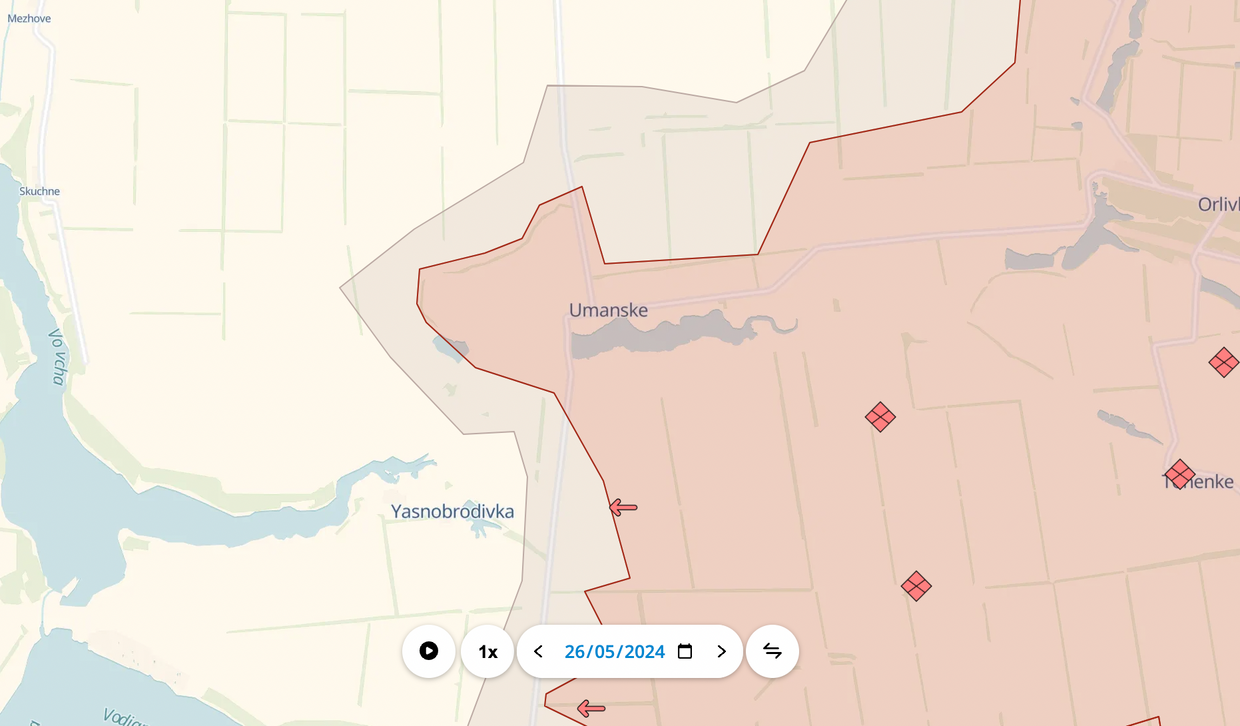Daily Flyer - June 2, 2024
A voice of Ukraine to the West

Russia claims occupations of Umanske village in Donetsk Oblast
Ukraine's eastern Donetsk Oblast. This announcement was made during their daily situation report. However, the General Staff of Ukraine’s Armed Forces did not mention Umanske in their report, instead noting that Russian forces were attempting to advance towards the village of Sokil, about 10 kilometers to the north of Umanske.
The Ukrainian General Staff stated on Facebook, "Two attacks have been repelled, three more are in progress. The situation remains tense. Defense forces are taking measures to stabilize the frontline."
The Kyiv Independent could not independently verify the claims regarding the capture of Umanske.
Umanske is situated in the Pokrovsky district of the Donetsk region, approximately 30 kilometers northwest of Donetsk. According to the crowd-sourced DeepState monitoring site, Umanske had already fallen to Russian forces on May 26, although this information also could not be independently verified.

The Russian independent news outlet Meduza, when reporting the Kremlin Defense Ministry's comments on June 2, said according to its own data "Russian troops captured Umanske no later than May 9."
"It is unclear why the department announced the seizure of the village only now," Meduza added.
Russia's Defense Minister Andrei Belousov said on May 31 that Moscow's forces had seized 880 square kilometres (340 square miles) of Ukrainian territory in 2024.
UK intelligence reveals consequences of detention of "highly competent" Russian general
In a recent analysis dated June 2, UK Defence Intelligence has scrutinized the detention of Russian Major General Ivan Popov on charges of fraud and corruption. This development, reported in conjunction with European Pravda, sheds light on the intricate dynamics within the Russian military hierarchy.
Ivan Popov, who formerly commanded the 58th Russian Combined Arms Army (CCA), faced dismissal in July 2023. His downfall was precipitated by his outspoken criticism of the Russian defense leadership's strategic decisions regarding the war. Following his removal, Popov did not hold back, describing the decision as a betrayal by senior commanders at a critical and challenging juncture: "Our senior commander hitting us from the rear, treacherously and vilely beheading the army at the most difficult and tense moment," he lamented.
UK Defence Intelligence's report provides a broader context for Popov's arrest, highlighting the endemic corruption within the Russian military. According to the intelligence authors, charges of fraud and corruption are often wielded more as political tools than genuine efforts to promote good governance. In Popov's case, his arrest is likely a punitive measure for his perceived disloyalty to his superiors.
Popov, known for his competence and popularity among the troops, now stands as a cautionary tale. The intelligence report suggests that his arrest will likely demoralize Russian military personnel further and serve as a stark reminder to his peers in senior command positions that loyalty and obedience to the regime and their superiors outweigh competence and charisma. This dynamic underscores a troubling aspect of the military's internal culture.
This incident coincides with other efforts to control the ideological narrative within the Russian military. UK Defence Intelligence also reviewed a newly released magazine in Russia called Politruk, aimed at educating Russian soldiers, indicating a concerted effort to maintain ideological conformity within the ranks.
The detention of Major General Ivan Popov underscores the precarious balance of power within the Russian military, where loyalty to the regime is often prioritized over effective leadership. As the military grapples with these internal struggles, the broader implications for morale and operational effectiveness remain uncertain.
Zelenskyy believes US should allow Ukraine to strike Russia with ATACMS missiles
In a recent address at a security conference in Singapore, President Volodymyr Zelenskyy emphasized the necessity for the United States to permit Ukraine to target military installations within Russia using long-range ATACMS missiles. His remarks, reported by European Pravda and citing The Telegraph, highlight a critical aspect of Ukraine's defensive strategy against ongoing Russian aggression.
Zelenskyy expressed gratitude to U.S. President Joe Biden for allowing Ukraine to strike Russian territory with American-provided weapons. However, he underscored the need to lift current restrictions on the use of long-range systems, arguing that Ukraine's ability to retaliate effectively remains hampered.
During his speech, Zelenskyy provided a compelling example to illustrate his point: Russian airfields. These sites are frequently used to launch attacks against Ukraine, with Russian forces operating from a position of relative impunity. "Is that [the permission] sufficient? No," Zelenskyy asserted. He explained that the current limitations leave Ukraine vulnerable, as it lacks the necessary systems and permissions to strike back at these critical Russian military assets.
Zelenskyy detailed the disparity in artillery capabilities, noting that Russia continues to deploy long-range artillery and approximately 300 weapons systems, equipped with tens of thousands of missiles, just across the border. This arsenal allows Russia to maintain a significant offensive capability while remaining largely unthreatened by Ukrainian counterstrikes due to the imposed restrictions on the use of Western-supplied weaponry.
The Ukrainian president's plea reflects the ongoing struggle for parity in military capabilities amid Russia's aggressive tactics. By lifting restrictions on long-range ATACMS missile use, Ukraine hopes to bolster its defense and deter continued Russian attacks. The appeal for greater military flexibility underscores the dire need for effective countermeasures in the face of sustained aggression, aiming to shift the balance and provide Ukraine with a stronger defensive posture.
Ukraine downed 24 drones launched by Russia overnight
In the early hours of June 2, Ukrainian air defenses successfully intercepted 24 of the 25 attack drones launched by Russia, according to a morning update from the Air Force. The drones were reportedly launched from multiple locations, including Cape Chauda in occupied Crimea, Yeysk in Krasnodar Krai, and the Russian port town of Primorsko-Akhtarsk, located on the coast of the Azov Sea. This port town is approximately 153 kilometers (95 miles) from Kerch on the Crimean Peninsula, which Russia annexed from Ukraine in 2014.
The Ukrainian Air Force, utilizing aircraft, missile and electronic warfare units, and mobile fire groups, intercepted the drones over several oblasts, including Mykolaiv, Kirovohrad, Odesa, Kherson, Kyiv, Khmelnytskyi, Dnipropetrovsk, and Vinnytsia, as stated by Air Force Commander Mykola Oleshchuk. Remarkably, no casualties were reported at the time of the publication.
In addition to the drone attacks, Russia also targeted Kharkiv Oblast with an Iskander-K missile launched from Crimea and fired an S-300 anti-aircraft guided missile from the occupied Donetsk Oblast. The status of these aerial targets, whether intercepted or not, remains unclear.
Drone attacks have become a daily occurrence in Ukraine, affecting various regions across the country. In recent months, Russia has intensified its assaults on Ukraine's energy infrastructure, launching massive drone and missile strikes aimed at critical facilities.
The night before, on June 1, Moscow's troops launched a significant attack on Ukraine, deploying 35 Kh-101/555 cruise missiles from Tu-95 bomber planes over the Caspian Sea, in addition to four Iskander-M ballistic missiles and one Iskander-K cruise missile from occupied Crimea.
Ukraine's Energy Minister Herman Halushchenko confirmed that energy infrastructure in several regions, including Zaporizhzhia, Dnipropetrovsk, Donetsk, Kirovohrad, and Ivano-Frankivsk oblasts, was targeted by Russian forces, underscoring the ongoing threat to Ukraine's critical infrastructure amid the ongoing conflict.

